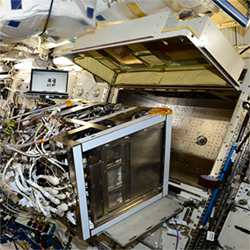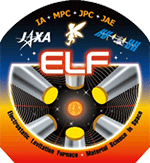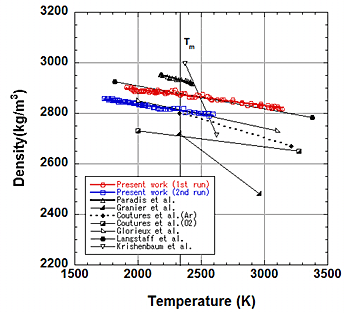This is an archive of information released in the past.
Disclaimer: It may contain broken links or outdated information. Some parts may not function in current web browsers.
*Visit https://humans-in-space.jaxa.jp/en/ for the latest information.

Experiment
- News
- Kibo Utilization Strategy
- Kibo Utilization Plan
- List of JAXA's Utilization Themes
- Experiment Facilities
- Space Environment Utilization
- Archive
Utilization of Electrostatic Levitation Furnace (ELF) has been started to obtain thermophysical properties of high-temperature melts
 |
 |
|
Electrostatic Levitation Furnace (ELF) attached to the Multi-purpose Small Payload Rack 2 (MSPR-2) (Credit: JAXA/NASA) |
The logo of the ELF Mission |
Summary
The checkout of the Electrostatic Levitation Furnace (ELF) installed in the Japanese Experiment Module (JEM) "Kibo"/International Space Station (ISS) has been completed and the experiments proposed from users have been started. The ELF is an experiment device which electrostatically levitates small samples (diameter=2 mm) and heats them. Refractory materials (melting points of up to 3000℃) can be melted in this furnace to measure their thermophysical properties without crucibles.
Fig.1 shows how the experiment on aluminum oxide was going during the checkout phase of the ELF.
Still Image

Fig.1
A molten aluminum oxide sample (central bright sphere) levitating in the midst of six electrodes (photo taken in July 2017)(Credit: JAXA)
Video
Video(mp4: 5.84 MB) taken during the experiments
(Fig.1 corresponds to the top left of the four-square indication)(Credit: JAXA)
High power lasers were used to melt stably levitated aluminum oxide sample (melting point=2054℃). The images of molten aluminum oxide were analyzed to determine the volumes of the samples. Their densities were calculated from their masses measured after recovery on the Earth. The obtained data were compared with the ones in the literature to verify the validity of the data with the ELF (Fig.2).

Fig.2 Density of molten aluminum oxide as a function of temperature
(Credit: Tamaru, H. et.al., Microgravity Sci. Technol. doi.org/10.1007/s12217-018-9631-8)
At present, a research team headed by Dr. Masahito Watanabe, professor at Gakushuin University is conducting an experiment using the ELF, "the thermophysical properties of high-temperature melting materials and interface phenomena: a basic study on ore refining process based on electrostatic levitation method." Experiments planned for the years to come include the "clarification of the origin of the fragility of high-temperature molten oxides in view of development of non-equilibrium oxide with unprecedented functions," an experiment headed by Dr. Shinji Kohara, Principal Researcher at the National Institute for Materials Science.
Article Information
The results of the Checkout of the ELF and the experimental results were published in the on-line issue of the international journal "Microgravity Science and Technology" on June 16, 2018.
Journal:Microgravity Science and Technology
Article:Status of the Electrostatic Levitation Furnace (ELF) in the ISS-KIBO
Inquiry
Services related to paid utilization of the ELF are available. If you have interest in the matter, send an e-mail to
Z-KIBO-PROMOTION[at]ml.jaxa.jp.
The demand situation depends on the target material. (When an e-mail is prepared, replace [at] with @.)
*All times are Japan Standard Time (JST)
| Copyright 2007 Japan Aerospace Exploration Agency | Site Policy |